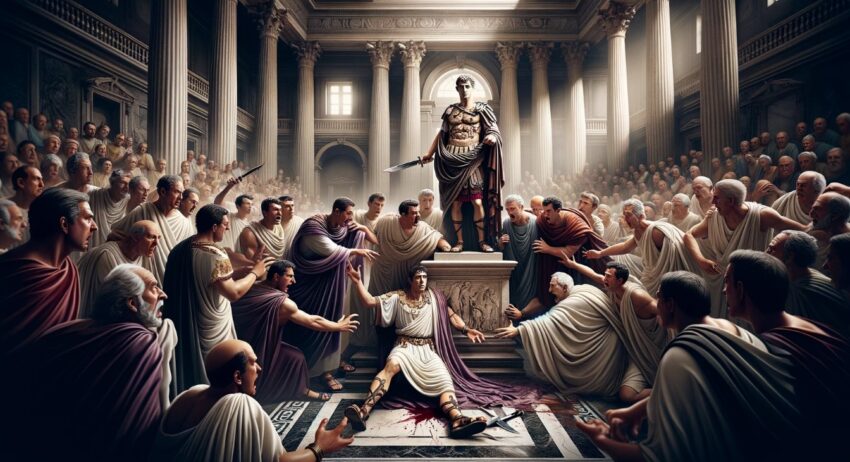Caesar’s Last Moments and his Famous Last Words
The final moments of Julius Caesar have been immortalized in various historical accounts, each adding to the dramatic narrative of his assassination. As Caesar succumbed to the coordinated attack by the conspirators, the scene was one of chaos and brutality. Ancient sources offer differing perspectives on Caesar’s demeanor and the exact sequence of events, but they converge on the sense of betrayal and the pivotal nature of his death.
According to Suetonius, in his work ‘The Twelve Caesars,’ Caesar initially resisted his attackers but soon realized the futility of his situation. Suetonius records that Caesar fell silent as he saw Brutus among the conspirators, covering his head with his toga in a final act of dignity. This gesture has been interpreted as Caesar’s resignation to his fate, a moment of profound personal and political significance.
Plutarch, in his ‘Parallel Lives,’ provides a more detailed account, noting that Caesar initially tried to defend himself but was overwhelmed by the sheer number of attackers. Plutarch famously records Caesar’s last words as “Kai su, teknon?”—”You too, child?”—addressed to Brutus. This phrase has been subject to much interpretation, with some scholars suggesting it reflects Caesar’s sense of betrayal by someone he considered almost a son.
However, the most famous rendition of Caesar’s last words comes from William Shakespeare’s play ‘Julius Caesar,’ where the dramatist immortalizes the line as “Et tu, Brute?”—”And you, Brutus?” While this version is likely a dramatization, it has captured the popular imagination and underscores the deep sense of personal betrayal that characterized the assassination.
Nicolaus of Damascus, a lesser-known but significant source, offers another perspective, emphasizing the surprise and rapid succession of the attack. He suggests that Caesar’s last words were more a gasp of surprise than a coherent statement, further highlighting the chaotic and brutal nature of his death.
These various accounts, while differing in details, collectively paint a picture of a leader who met his end surrounded by those he once trusted, in a moment that encapsulated the intense political strife of the time. Caesar’s death did not just mark the end of his life but also symbolized the end of an era and the tumultuous transition from the Roman Republic to the Roman Empire.
 |
 |
 |


